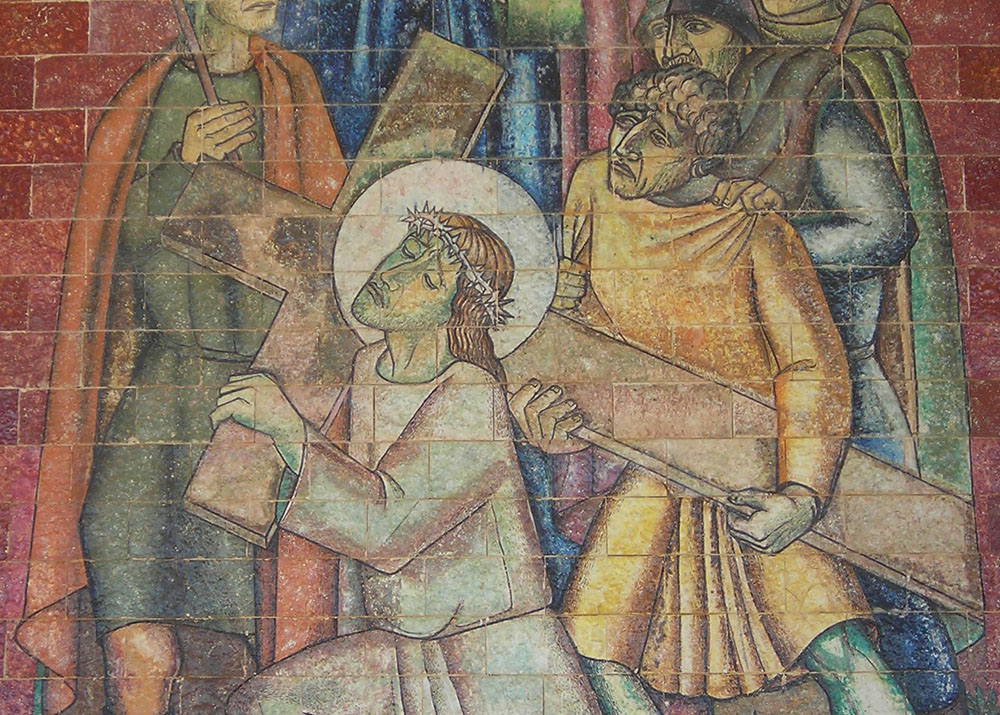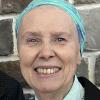
Simon of Cyrene helps Jesus carry the cross in a detail from the Fifth Station of the Cross at the Sanctuary of Our Lady of Fátima in Portugal. (Wikimedia Commons/Therese C)
Recently I picked up The Little Black Book, written by the late Bishop Ken Untener of Saginaw, Michigan, to help me reflect on Scripture and deepen my relationship with Christ. One of the reflections in the book was about Simon of Cyrene. Simon has become world-famous, yet we hear about him in Scripture only once.
Simon came from Cyrene to Jerusalem, probably for the Passover. Simon was a passerby; he was no relation to Jesus. Luke says he "came in from the country." He was just part of the crowd that gawked at this man who struggled under the weight of a huge cross on his way to be crucified. Simon didn't volunteer to help. He was forced into this very difficult job of carrying a heavy cross by the Roman soldiers.
The Little Black Book says, "He carried the cross, not knowing why. Or where he was going. But he wasn't lost. He was following the Lord."
These words have become a mantra for me. I have thought about them and repeated them to others who, I sense, have pondered them too. "He carried the cross, not knowing why. Or where he was going. But he wasn't lost. He was following the Lord."
I wish I'd had these words to ponder one dark night when I was driving on a two-lane highway with no roadside lighting. Only the headlights of my car lit up the motorway.
Advertisement
Suddenly the road dipped down into a blanket of fog. Fog in front, fog behind, fog all around. I couldn't see the hood of my car. I was scared. I prayed to God that I might see some headlights in front of me. But no lights. Was the road straight or did it curve? I didn't know. I gripped the steering wheel, and prayed to God that the road didn't curve.
I don't remember ever being more frightened in my life. I thought I would collide into the guard rail and another car would come crashing down on me. I carried the cross of fear and prayed, "Thy will be done."
Like Simon, I did not know where or when or how this dark road would end. Like Simon, I did not choose this circumstance. I wasn't lost, but had no idea where or how this would end. I could do nothing but follow wherever the Lord would take me.
Then, just as suddenly as it had appeared, the fog vanished, and I saw the road. I was overjoyed to see trees on one side, and some lanes across the metal divider on the other side of the highway!
I like to think I learned from this experience to trust God that, no matter how bleak and tragic things appear, God will make all things right. But I'm not sure I have learned.
My faith is weak. I see so much pain and suffering in the world. I look at refugees fleeing the violence of a war-torn country. I see the economically poor lost in a society where the wealth gap between rich and poor increases each year, worsened by climate change. I watch as people of color are harassed and beaten by those charged to protect them. Like Simon, they are all carrying a cross, not knowing why.
'He carried the cross, not knowing why. Or where he was going. But he wasn't lost. He was following the Lord.'
It takes sincere reliance on God to experience pain or suffering "in the dark," without understanding why or how this pain can be redemptive, how this pain will somehow be transformed into good. Isn't that part of the meaning of faith?
A complete trust or confidence that God can draw good, even from evil. As Julian of Norwich said in her Revelations of Divine Love, "All shall be well, and all shall be well, and all manner of things shall be well."
Deep down, I believe that in the fullness of time, all will be well. It may take centuries or even millennia, but this "fullness of time" will come. When the human community has grown in its understanding of right and wrong; when people honestly acknowledge that good should always be done and evil avoided; when the human family lives as loving brothers and sisters, then Christ will arrive once again to proclaim the everlasting reign of God. Then all evil will be overcome and sadness and oppression will be no more.
But until then, we as individuals and as a society are all Simons. We're asked to carry a huge, splinter-filled cross and we don't know why. We don't know where we're going. But when we trust, we're not lost. We're just following the Lord.







